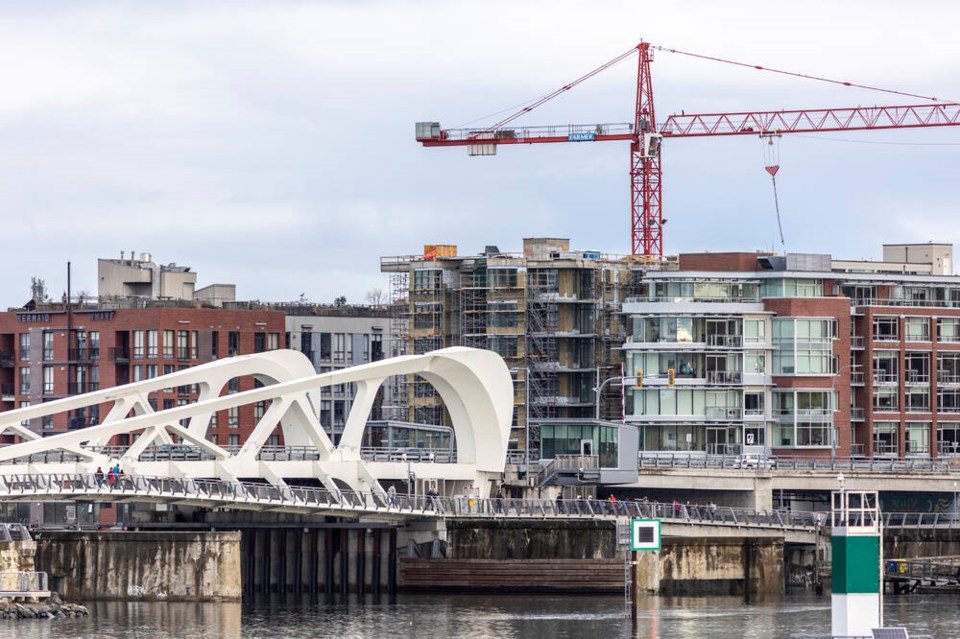Homebuilders in Greater Victoria are not convinced the province’s new “one-stop-shop” approach to provincial permitting will make much of a difference in the short term to the number of new housing units created.
Builders, who set a record for new home construction in the region in 2021 with 4,809 new homes started and were on pace to break that in 2022, say the new permit procedure still does not tackle the biggest hurdle.
“Any permit efficiencies are a plus,” said Casey Edge, executive director of the Victoria Residential Homebuilders Association. “But the main inefficiency and obstruction is at the municipal level. This provincial announcement does not address the biggest challenges.”
Edge said delays at the municipal level in some districts have been the real drag on the industry.
Chris Atchison, chief executive at the B.C. Construction Association, said the changes are a step in the right direction and it puts the ball in all municipalities’ court.
“It’s a positive step and we have to see it for what it’s worth, because there are other barriers to permitting that occur at the municipal level,” he said. “I think as municipalities see this, they should take notice that the province is serious. And now [they should consider] what are they doing to alleviate some of the backlogs, what are they going to do among themselves to improve things.”
The new approach to provincial permitting is designed to speed up approvals and construction in the face of a housing crisis.
“Today we are taking action to remove obstacles to building the homes that we need,” Premier David Eby said Monday in an announcement at the University of B.C.
“We will be identifying those high-impact housing projects and moving them through the system — maintaining those high standards, but prioritizing them through the system to get them out the door so that work can start now building those homes we so desperately need as our population grows so dramatically,” said Eby.
Homebuilding in B.C. can require multiple provincial permit applications involving different ministries and processes, including permits related to riparian area approvals, water licences, transportation approvals, road rezonings, contaminated sites and requirements for heritage inspections, according to the province.
The average approval time is two years “and obviously our goal was to improve on that,” said Eby following the announcement. “The goal is to reduce that dramatically” — from years to months.
“The UDI has been advocating for these changes for quite some time, so as an organization, we’re very pleased to see that these changes are actually coming,” said Kathy Whitcher, executive director of Urban Development Institute Victoria. “It definitely will help speed up the process.”
Whitcher admits a lot of construction in cities like Victoria, projects classed as redevelopment of existing buildings, won’t be affected, but she said this will likely make a difference to some larger projects.
She also said it’s a harbinger of change to come at the municipal level, which would make a bigger difference.
“We will be even more happy when we see some changes come to the local government level,” she said.
“The ministry is telegraphing that they are doing what they can to clean up what they can control in order to line up with the priorities around affordability and the increase in housing,” said Atchison, who said he could see the change having an impact in projects that require some site remediation.
The permitting strategy will be streamlined, potentially eliminating the need for multiple applications across ministries, says the province.
“This is more than just a single place to drop off your application,” Eby said. “Our goal is an expedited process where information doesn’t have to be re-submitted, reconsidered and redetermined by multiple decision-makers throughout the process.”
The government has introduced several housing-related changes since Eby became premier in November, including changes to the Housing Supply Act to set targets in the province’s fastest-growing municipalities as well as to the Strata Property Act to open up more rental options and more housing for families.
Eby said B.C. municipalities have in the past cited long wait times for provincial approvals and now the province is doing its part.
“One thing that’s been obvious to me is each time I’ve raised this issue, the mayors rightly point to the problem and they say: ‘Look, you need to get your own house in order’ … So that’s what today’s announcement is all about,” he said. “We’re doing our part, we’re doing the work.”
While the single application process is being established over the coming months, a cross-ministry team focused only on processing housing permits will be in place to expedite permits and approvals.
To start, 42 new full-time positions will prioritize housing that most urgently needs to be built, such as Indigenous-led projects, B.C. Housing applications and applications for buildings with multiple units.
Once those positions are filled, the plan is to to increase the team to 203 positions.



